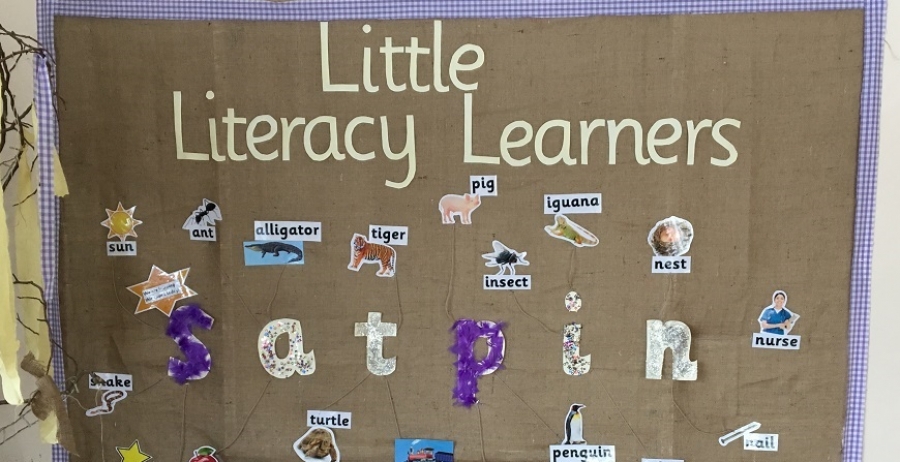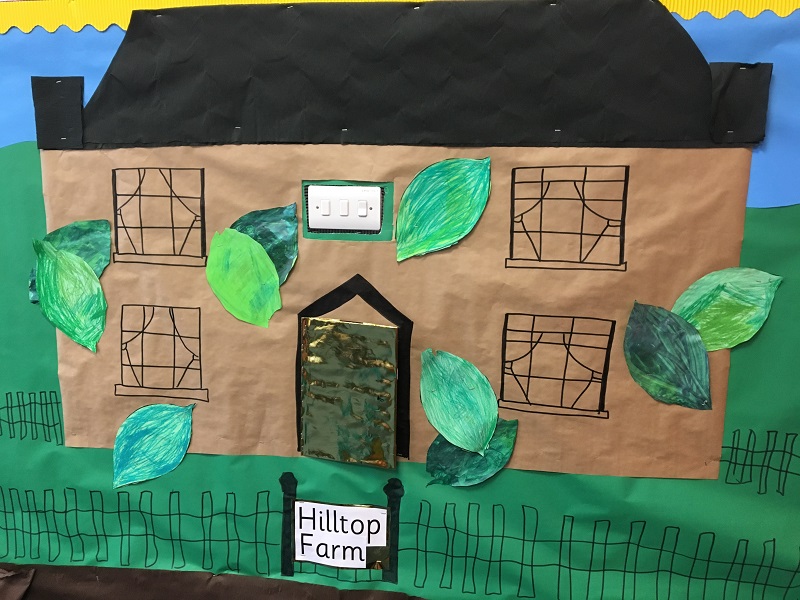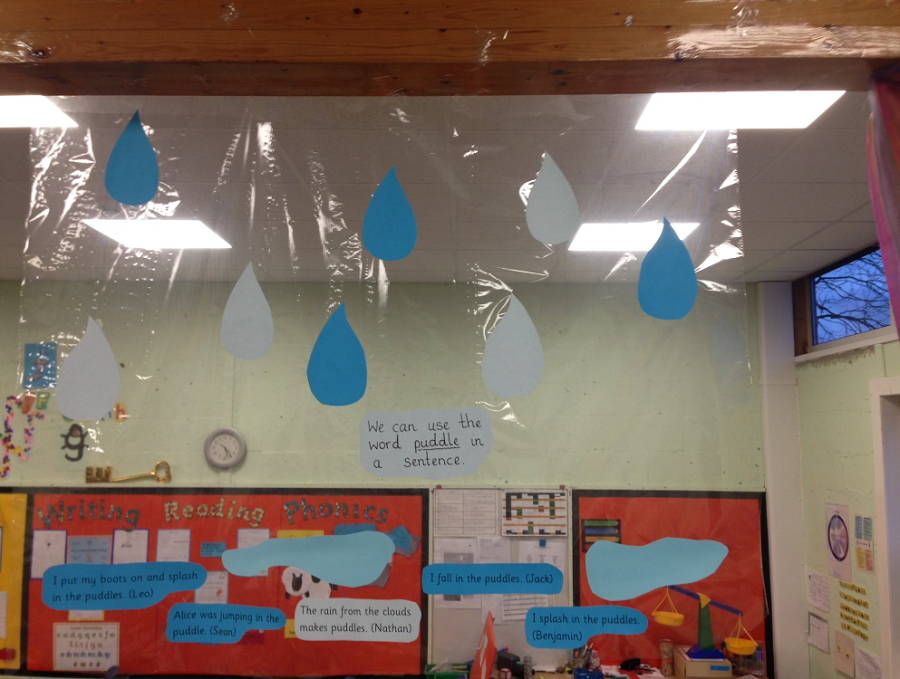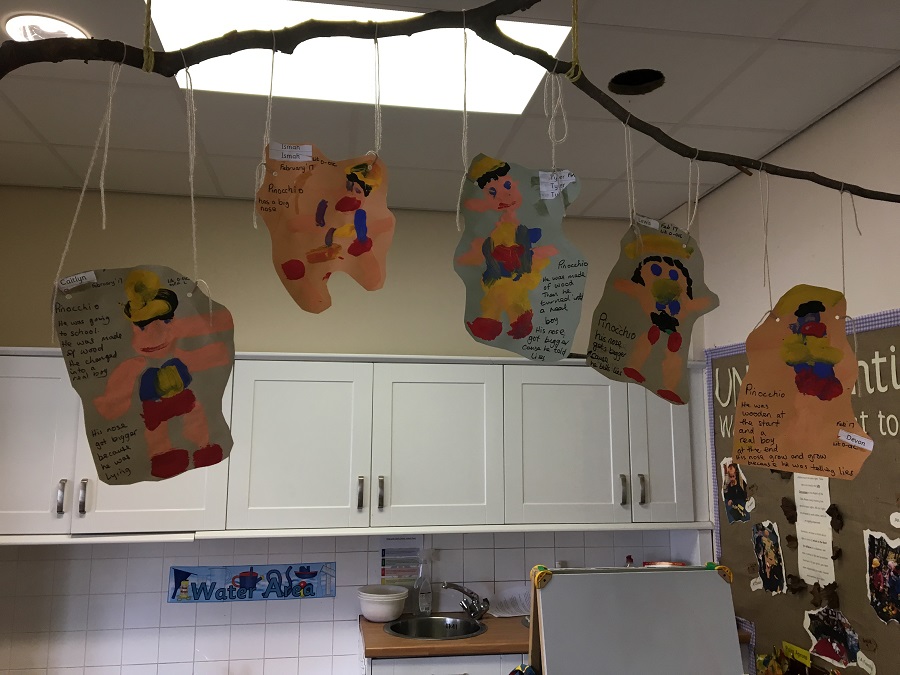By embracing personal choice, fiction and non-fiction texts, and texts which have been originally written in another tongue, the children become more engaged in the art of reading and understanding literature.
Literacy Displays
In the build-up to literacy fortnight, we see staff working incredibly hard to create exciting, engaging interactive wall displays (Some are more artistically hung from ceilings!). The literacy/display geek within me gets very excited at the prospect of creating an inspiring environment to engross the children.
In Early Years, we like to stimulate the young inquisitive minds by setting up small clues in the classroom; Primary One saw the arrival of a messy Peter Rabbit, who decided to leave footprints and remnants of eaten vegetables in the classroom, before hiding under one of our sound boxes. Beatrix Potter’s Hilltop Farm is a prominent display in the class and will continue to build and evolve as we read her other texts.
As a starter to their story, Alice in Wonderland, Enhanced Provision entered the classroom to find a large golden key and a small door in the wall. This generated conversation between the children. Where did the key come from? Is the key for the door? Will it fit? These are the sort of questions we want the children to ask and indeed find out the answer to.
What we do at Nethermains
On World Book Day, we encourage the children (and staff) to dress as their favourite literary character. On this day, the children take part in a quiz, literacy activities within the class and are encouraged to talk about their character and their favourite stories. This is a great day to generate lots of good conversation about everyone’s fun and wacky costumes.
Our nursery has embraced a very positive attitude towards literacy this year and has provided an opportunity for the nursery children to visit the newly built local library. The parents were actively involved in this visit; assisting the children in their walk to library and engaging in important dialogue with the children and staff whilst in the library. Both parents and children loved this visit and found it extremely productive in not only visiting a literacy hub, but also in promoting positive, supportive relationships between the adult and their child. The nursery is also focusing on traditional fairy tales and are following literacy and numeracy based activities linked to each focus.
The whole school organises a Bedtime Story session; children can wear their onesies, snuggle into a comfy bean bag with a good book, and parents are invited to read a story with their child and their peers. This is a session where the parents are actively encouraged to take the lead in the session. The children are very enthusiastic about this and benefit so much from having one of their adults there to share the whole experience with.
Primary One’s Interdisciplinary topic this term is based around the stories of Beatrix Potter, which in fact, ties very nicely into our literacy focus week. We decided to choose this topic as it not only gave the children one character they would be familiar with through the likes of CBeebies, but also allowed them to access a piece of classical literature without being burdened by complex vocabulary.
We felt that the children were ready for these texts, as we have, as a whole class, been working on a new vocabulary approach which in turn, has developed the children’s knowledge and understanding of vocabulary.
Word Aware, it works!
Last year I attended a CPD event on Word Aware: ‘Teaching vocabulary across the curriculum, across the day’ (see it here). I was so impressed with the methodology and creative teaching style that I decided to implement it into my classroom and with very positive results!
We learned the word 'tale' from The Tale of Squirrel Nutkin. It's a tricky one, as we knew it had more than one meaning! @WordAware pic.twitter.com/D6H8kg0Omo
— P1 at Nethermains (@NethermainsP1) February 22, 2017
I chose to adopt STAR approach within Primary one, which allowed us to access topic based vocabulary at the right level for the children.
Select: We began to teach a Word Aware session once a week, with a focus on a word which has been chosen from a text based on our current Interdisciplinary topic.
Teach: In this session, we encourage the children to identify the word, look at its initial sound, clap out the syllables, use robot voices and find a rhyming word; the basic elements of Early Level literacy. We then move on to the semantic aspect of the word by looking in the dictionary as a class and finding its meaning. The children then put the Word of the Week on our vocabulary wall and into our magic word box.
Activate: The class are encouraged to take part in active games where they do star jumps when they hear the Word of the Week, or walk around the room and tell the people they meet their new word. When the meaning is shared, the children have to create a sentence using the word in context. We normally collate the sentences onto the smartboard and then complete a written activity to follow up.
Review: The word on the vocabulary wall is accompanied by a picture clue to help them remember the vocabulary. We use the magic word box to review sight recognition of the words we have covered.
We also promote parental engagement in the review process of STAR approach. Twitter challenges are set and children are encouraged to teach their Word of the Week to their adults and siblings at home.
How has it helped?
The impact of Word Aware within our class has been tremendous; the children have been engaged in our sustained vocabulary experience. They enjoy the process of learning new vocabulary and have become to understand the routine of how we learn this new vocabulary.
Parents have commented on how their children have a growing understanding of vocabulary and a new-found confidence of using this vocabulary in their independent sentence writing or even in dialogue with an adult at home.
As teachers, we have seen a marked improvement in basic sentence structure and using vocabulary within context. Now, we are seeing children use the working word wall to choose vocabulary to up-level their sentences independently. I have to say, hearing the children shouting out words that you have learned months before, is just the best feeling. It is in this review process, that as a teacher, I can see that the children have engaged in the approach and that they have enjoyed the learning experience.
What we aim to do
“Today a reader, tomorrow a leader.”
Margaret Fuller
With the Scottish Government’s high-priority focus on closing the poverty-related attainment gap, it would seem, that in embracing literacy with open arms, as we do in literacy fortnight, we are helping to ensure that every child has the equal opportunity to succeed in life.
In getting parents involved in aspects like going to the library, reading at the bedtime stories session, promoting talking homework, regular reading tasks at home and being actively involved in the review process of vocabulary sessions, we are beginning to reduce educational inequality. By allowing parents to access their child’s educational experiences, whether it be through activities at school or Twitter engagement, we are giving them the opportunity to gain an education, to learn how to help their child and support them in their journey to success.
Useful links
- Primary 1 on Twitter @NethermainsP1
- Nursery on Twitter @netherweans
- Enhanced Provision on Twitter @EPNethermains
- Word Aware on Twitter @WordAware
- uk.pinterest.com/wordaware - Follow Anna Branagan and Stephen Parsons on Pinterest
How do you promote literacy in your school? Sound off below!





















